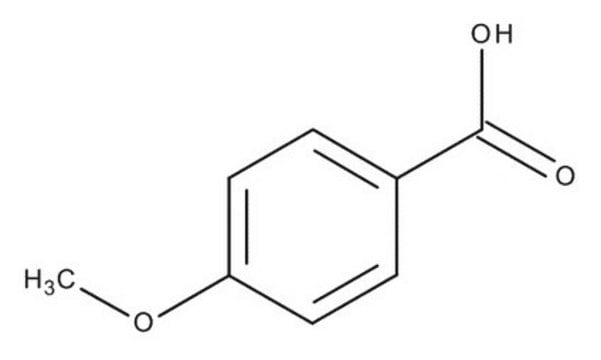42183
Melting point standard 182-184°C
analytical standard
Synonym(s):
p-Anisic acid, 4-Methoxybenzoic acid, p-Methoxybenzoic acid, Draconic acid
About This Item
Recommended Products
grade
analytical standard
Quality Level
shelf life
limited shelf life, expiry date on the label
mp
182-184 °C (±0.3°C)
182-185 °C (lit.)
application(s)
food and beverages
pharmaceutical
format
neat
SMILES string
COc1ccc(cc1)C(O)=O
InChI
1S/C8H8O3/c1-11-7-4-2-6(3-5-7)8(9)10/h2-5H,1H3,(H,9,10)
InChI key
ZEYHEAKUIGZSGI-UHFFFAOYSA-N
Looking for similar products? Visit Product Comparison Guide
General description
Application
Features and Benefits
- Traceable to primary standards from LGC, London
- Grade: Analytical Standard
- Melting point standardized in the thermodynamic mode of analysis
- Standard deviation up to ± 0.3 °C
- Documented with certificates of analysis and safety data sheet
Storage Class Code
13 - Non Combustible Solids
WGK
WGK 1
Flash Point(F)
365.0 °F - closed cup
Flash Point(C)
185 °C - closed cup
Personal Protective Equipment
Choose from one of the most recent versions:
Already Own This Product?
Find documentation for the products that you have recently purchased in the Document Library.
Customers Also Viewed
Our team of scientists has experience in all areas of research including Life Science, Material Science, Chemical Synthesis, Chromatography, Analytical and many others.
Contact Technical Service








